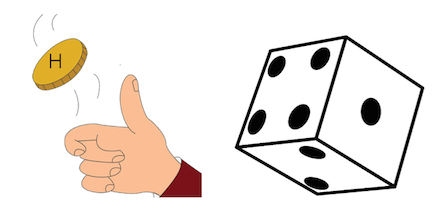Independent Events
 You flip a coin and roll a die. Let
be the event you flip a heads and let
be the event that you roll a 4. What is
You flip a coin and roll a die. Let
be the event you flip a heads and let
be the event that you roll a 4. What is
Note: denotes the probability of occurring given that occurs.
This section requires Javascript.
You are seeing this because something didn't load right. We suggest you, (a) try
refreshing the page, (b) enabling javascript if it is disabled on your browser and,
finally, (c)
loading the
non-javascript version of this page
. We're sorry about the hassle.
Because the events are clearly independent, P ( H ∣ F ) = P ( H ) . That is, the event of the 4 being rolled does not change the probability that the heads is flipped!